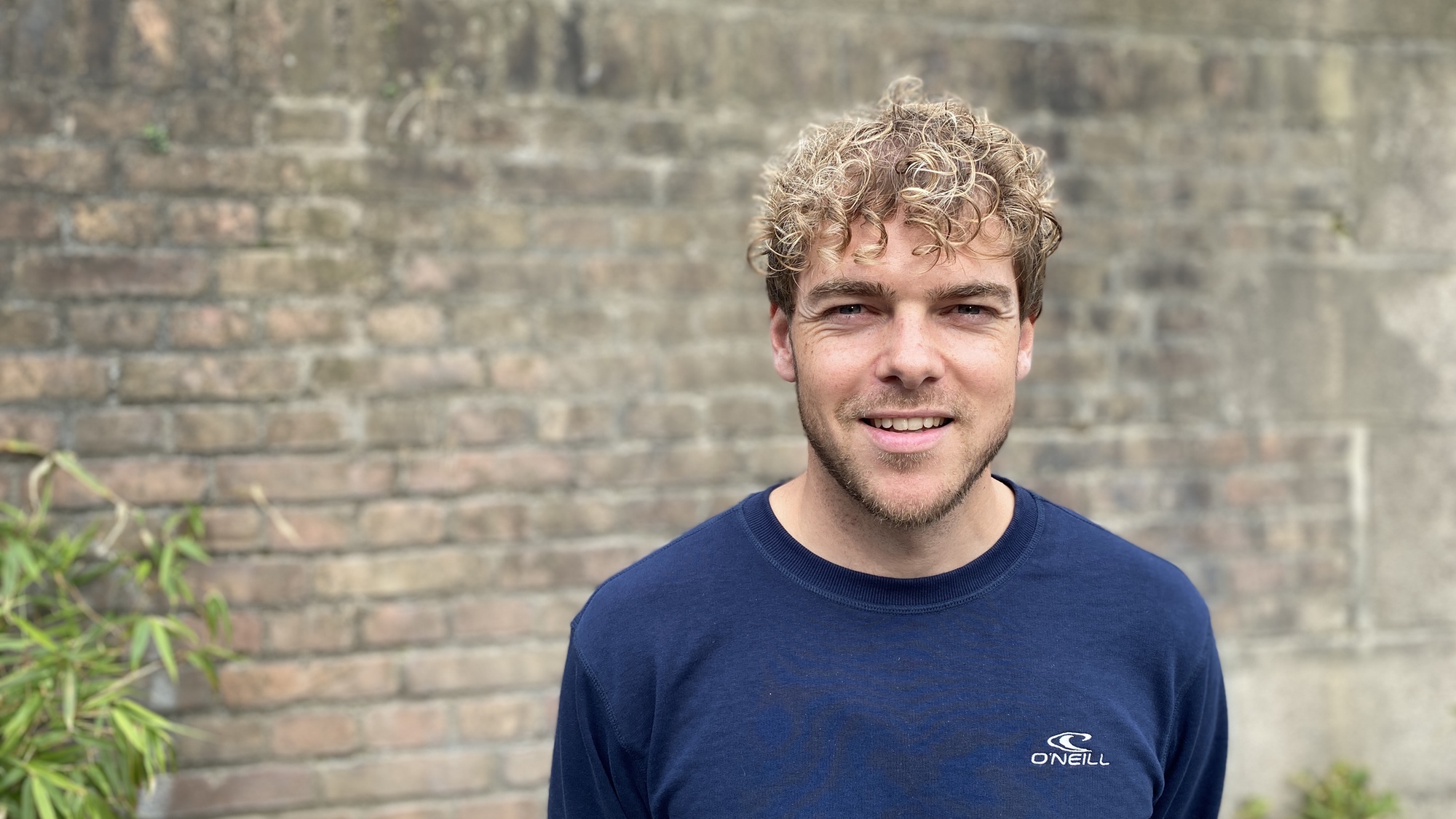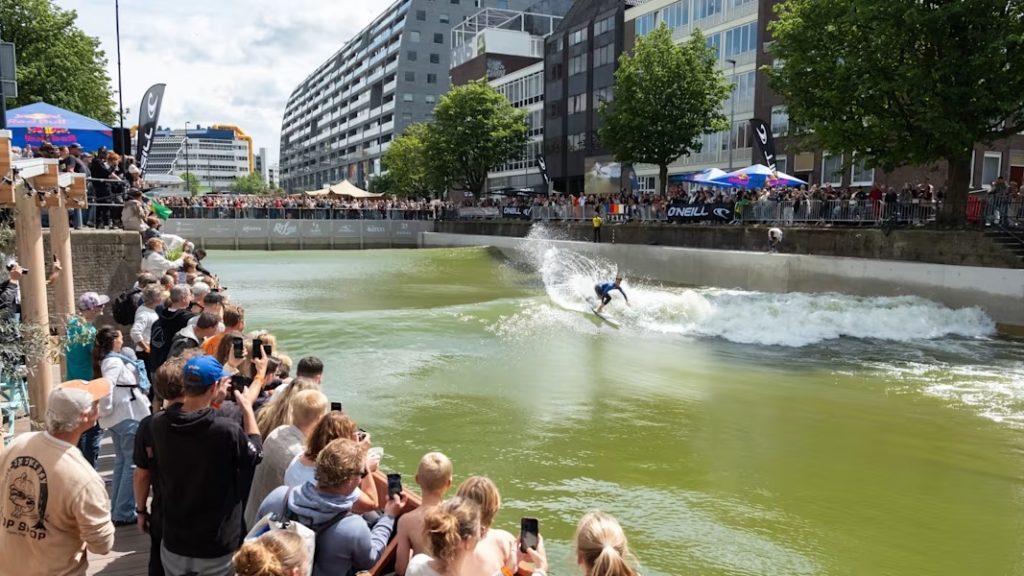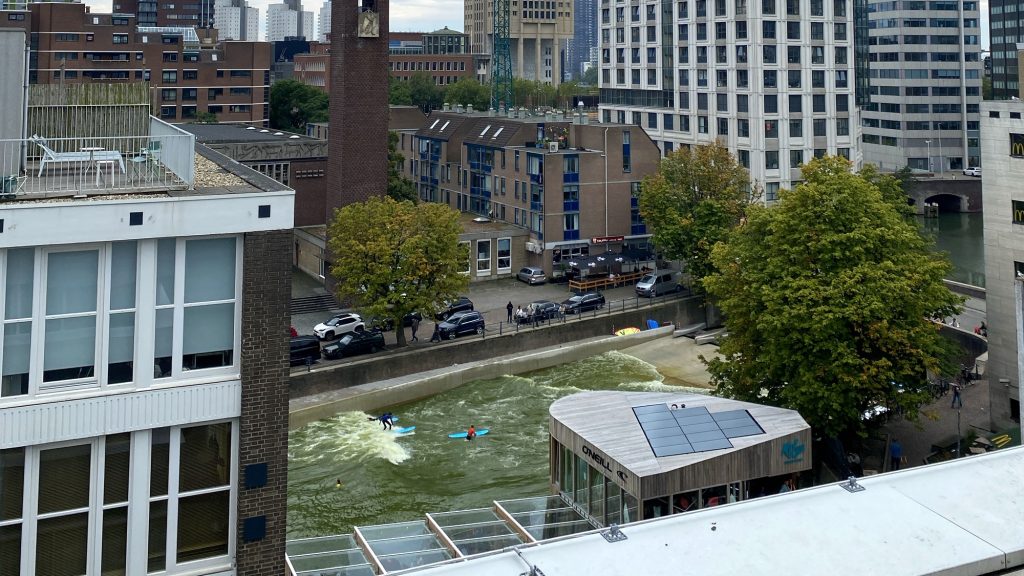Employee of the Month: Jeroen Dorst Dijkema of RiF010

The Netherlands doesn’t really have a whole lot of natural resources. Maybe some fish. But that’s about it. For this reason the country has a long history of being very creative and industrious.
“For us it means we are traders because we have no resources really,” one Dutch friend told me. “So therefore we had to be open to other cultures and learn other languages so we could exchange goods and survive.”
This Dutch existentialism emerges in everything from the tulip market to Sinterklaas – a Christmas tradition where kids must leave a shoe, a carrot and a drawing illustrating their good behavior for the year before they can collect any loot. Yes, they have to work for it. Oh, and if the kids are bad they get shipped off to Madrid, Spain as the legend goes.
So something as laborious and bizarre as a wave pool in a canal in the center of downtown Rotterdam, isn’t really that far of a stretch by Dutch standards. This cultural ethic of hard work and creativity is ever present in RiF010 Activities Manager Jeroen Dorst Dijkema. Utilizing limited space in the middle of a busy public, urban zone all while keeping a smile and good vibes is the reason Jeroen is WavePoolMag’s Employee of the Month.

What is your job here?
I’m the Activity Manager at RiF010 (pronounced Rif-not-ten) and activities for us is mostly, of course, the part of surfing. But you can see the canoes lying on the patio. We have the Stand Up Paddle Boards as well for use.
Let’s start with your background. How did you come to this job? And how long have you been surfing?
I have a completely different background; I come from the world of logistics. I was a logistics engineer and created logistical processes in the Netherlands and abroad. I always say I knew how to create something from nothing. That was my previous job, and I’ve been surfing for roughly 20 years. I started when I was 12 years old in Holland, near the port of Rotterdam. A school friend of mine had a father who owned one of the first online surf shops in Holland, which was quite innovative at the time. I learned to surf there during the summer, and like most school-going youth, I went with my parents around Europe to surf during the summers. Slowly, bit by bit, when I turned 18, I became completely hooked and bought my first longboard, which I’m still using today.
How did that role turn into a job here?
I was looking to do more with surfing because I was frustrated with some of the lessons. I have a son who was ten at the time, and we enrolled him in a surf school, but I was disappointed with the lessons. I thought, ‘why not get my ISA certificate, learn more about it, and start reading some books? Maybe this is something for me.’
At the lifeguard course, I met Edwin, who is the owner of Rif010. His wife was already horseback riding with my wife, so we knew each other a little bit. He asked me if I wanted to join him on a trip to The Wave in Bristol in two weeks. I thought, why not? A couple of weeks later, we were on a plane to England together. I realized I needed to move from my logistics job to something that aligned with my passion — surfing. I had always been busy with numbers, but I wanted to do more with people.
Can you you run us through your daily routine here as Activity Manager?
We have some head instructors working under me in a team, currently two. When I arrive, we always check in with each other to see how we’re feeling, and then we take a look at the machines. We have large pumps and the wave chamber, so we check the pressure. I’m not a technical expert, but I’ve learned a lot about the different machines we have here.
Next, we review the planning for the day and the next day to identify any challenges. If we have large groups coming in, we discuss who we need to talk to and what kind of participants we have in the pool, as well as which sessions we are running. These are usually just a few quick points. After that, the head instructors start up the operations with the team. I typically check in to see how everyone is feeling and if they’re doing alright. Then I head to my desk and start looking ahead, as most of my job involves planning for days and weeks in advance.

So that’s where your logistics background comes in.
Yes, that’s where the logistics come in. In addition to the activities, I’m also responsible for the shop. We regularly assess how the turnover is doing and how our products are performing. Right now, I’m focused on what we can do during the winter and evaluating how the materials are holding up after our first high season.
What takes the most wear at your location? wetsuits, boards…?
And the surfboards for sure. But the wetsuits and leashes too.
What happens to them?
At the beach part of the wave pool, we teach and instruct people close to the shore, which is concrete. We often see that once people stand up, they get a quick rush and continue standing until their board reaches the beach. As a result, we experience a lot of wear on fins and boards.
One of our biggest challenges, especially in the city center, is space. We conduct our dry teaching on the beach, but since it’s concrete, practicing pop-ups on it can wear down wetsuits as well.
During the high season, we often run 8 to 10 sessions a day, including beginner lessons and next-step lessons. This means wetsuits can go on and off up to 20 times a day. That takes a toll on the materials we use, which is a significant concern for us.
So what is the best thing about this job? What do you love? What gets you motivated to come back each morning?
What I love is the sheer joy of people coming out of the water. They arrive with the mindset of wanting to surf, and they leave with big smiles on their faces, reflecting on what just happened. I love seeing people fall ten or fifteen times, but when they finally catch their first wave, their enthusiasm and that smile give me a really positive energy.
You can wake up in the morning feeling a bit down, but encountering someone who just caught their first wave can completely change your day. That energy is what makes this job so rewarding. It’s always the small things that create these amazing experiences.
It’s interesting, so many people in the surf park industry say the same thing – that it’s the vibes and happy people that make the job great. Now, conversely, what are some of the other challenges beyond logistics?
Of course, it brings some challenges. For instance, we are downtown and sometimes we have trash blowing into the water, but we address that during our startup rounds. Being a lifeguard or surf instructor at Rif010 means arriving two hours before the waves start rolling to clean everything. We clean the entire pool, the terrace, and the decks. This is the normal start of the day, and I think it sets us apart from other pools around the world.
Yeah. What’s the what’s the strangest thing you’ve found in the lagoon?
Yes, definitely a lot of plastic. One time I found this huge rubber duck. It was bright yellow but was deflated, so it was lying on the bottom. We found it one time after apparently losing a stick with the net while we were cleaning. We dropped it in the water, and it sank to the bottom. It was gone for a couple of weeks until someone suddenly felt something on the bottom and pulled it out again.

Related Coverage
